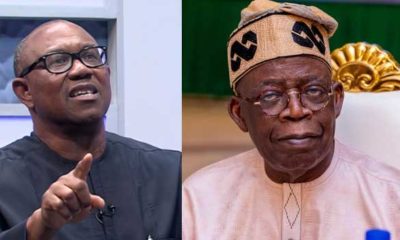Business
Forex: Speculation, Round-tripping, Account For Naira’s Continuous Fall

MUST READ:
Chief Executive Officer, Confederated Facilitators Limited (CFL) Group of companies, Lai Omotola has opined that the soaring dollar to naira rate, with adverse effects on Nigeria’s economy is not being driven by market forces but by wealthy elite businessmen whom he tagged, ‘market cabals’
He bared his mind at a media parley organised by his company in commemoration of its 25th anniversary.
According to him, “I have never seen elite business people whose only business they do is to speculate on their currency. That’s the only business they do. All of them, in everything they are doing, the underlying factor is that they are speculating.
“And this is how they do it. They may have a manufacturing plant, no doubt about it. For instance, the manufacturing plant needs $10 million, so they need to buy dollars. But the truth of the matter is that nobody is investigating if their actual need is $10 million or if they need something lesser than what they say they need.
“So, most likely, they only needed $1 million, but they will collect $10 million. They will send the $1 million to their supplier, convert the remaining $9 million to Naira, and go and sell it to the black marketers. Now, when you have a gap of over N300 in the exchange rate and you are selling $9 million, you are making N270 million without having a staff or investing anywhere, but just taking dollars in and out.”
“That business is sweeter than cocaine, which is why all of them are locked into it, and that is why Naira today is moving towards N1,200 for a dollar. When this present government was floating the Naira, it was to make the difference between the Naira at the official market and the parallel market not to exceed N2. That’s the meaning of floating. But this government has forgotten that when you float the Naira, there is no dollar in the Central Bank of Nigeria, CBN, to back that Naira.
“And it’s a matter of demand and supply. Anything in life, if today more people are looking for a particular substance than what is available, the price of the substance would go up. It is fundamental economics. If fewer people are looking for it, the value will depreciate. That’s the issue of demand and supply. So when you now allow the Naira to float, when you don’t have enough dollars, guess those with the dollar. It’s with the market cabals, ”he said.
He added, “Nigeria’s economy is not powered by market forces. There is nothing called market forces in Nigeria’s economy. Nigeria’s economy is powered by market Cabals. Regulating the currency has moved from the hands of the CBN to the hands of the Market Cabals. Let me tell you how they operate. For instance, they know that Nigeria requires $100 million to have that floating that will keep the difference between the official rate and parallel market at N2.
“And the cabals are the ones that have the $100 million. So they will only release $50 million into the economy. Now, when you release $50 million, demand for the dollar will become much higher, and the supply will become lower, thereby influencing and increasing the price of the dollar to Naira. CBN cannot intervene because there is no dollar.
“So the market cabals always have dollars with them. And they work in circles. They have dollars with them, they are the ones supplying dollars to the market, and they make a hell of a profit from the circles. So which business can be better than that?”
He said in other nations, the need for dollars is only for raw materials, school fees payment, or other productive things. But in Nigeria, two things contribute to the need for dollars; corruption, which is bribery, and speculations.
He noted that productive need for the dollar is not up to 40 per cent, “and that is where the challenge is. How do you fight against this kind of behavioural pattern?
“So our business elites that have funded politicians to win an election that are doing this type of not too-tidy business are the ones that have held our Naira in captivity. And as long as they are in charge, it will be difficult for the Naira to gain strength against the dollar.
“The worst part of it is that if the government goes today, pump $20 billion into the economy, 80 per cent of that money will end up in their hands, and they will continue to use it in an unproductive means because they want that dollar to Naira gap to continue to exist.”
Business
Savannah Energy Provides Unaudited FY 2024 Trading Updates

Savannah Energy has shared a trading update on its Nigerian operations and other markets in Africa, including up-to-date cash collections in its Nigerian business.
According to the update, made available on Thursday in Lagos, its gross production in Nigeria averaged 23.1 Kboepd for FY 2024, broadly in line with the prior year’s 23.6 Kboepd, of which 88% was gas (FY 2023: 91%).
On the update, CEO of Savannah Energy, Andrew Knott, said, “I am pleased to provide a FY trading update which demonstrates the continued progress we have made in 2024, a year which saw the highest level of cash collections ever recorded by our Nigerian business. 2025 is expected to be an exciting year for our Company: we have a large planned operational programme in Nigeria which is anticipated to enhance both our oil and gas production levels and capacity; we intend to progress our R3 East oil development project in Niger; we continue to pursue key acquisitions in the upstream oil and gas space; and we continue to seek to build our power business.
“Fundamentally, Savannah remains unequivocally an “AND” company, seeking to deliver strong performance both for the short AND long term across multiple fronts, and pursuing growth opportunities in both the hydrocarbon AND power sectors.”
The update It also shows that it generated a Total Income of US$393.6 million in 2024, compared to FY 2023’s US$289.8 million. This consists of Total Revenues of US$258.7 million and Other operating income of US$134.9 million.
The report also shows that Savannah’s FY 2024 Total Revenues were ahead of the previously issued financial guidance of greater than US$245 million, while FY 2024 financial guidance is reiterated for Operating expenses plus administrative expenses at ‘up to US$75 million’. The company expects its FY 2024 capital expenditure to come in lower than planned (previously guided at ‘up to US$50 million’) due to the phasing of spend.
ALSO READ: CSR: Dangote Awards Scholarships To 473 Students
According to the update, Savannah’s cash collections in 2024 amounted to US$248.5 million, a slight increase from the US$206 million it received in 2023. The report further shows that its cash balances as at 31 December 2024 stood at US$32.6 million, compared to the 31 December 2023 figure of US$107.0 million.
The report shows that the company’s midstream subsidiary, Accugas Limited, had as at 31 December 2024 drawn down on its NGN332 billion of the NGN Transitional Facility, with the resulting funds being converted to US$, which, along with cash held, was used to partially prepay the existing Accugas US$ Facility, leaving a balance as at 31 December 2024 of approximately US$212.3 million.
The report also provided new updates on Accugas’ US$45 million Uquo Central Processing Facility (“Uquo CPF”) compression project in Nigeria, noting that its commissioning which will enable the expansion of gas production in the medium term is well underway.
The report highlighted the progress being made in the procurement process of long lead equipment in Nigeria for a potential two-well drilling campaign on the Uquo Field in H2 2025, with an additional gas development well expected to add up to 80 MMscfpd of supplemental production capacity and a potential exploration well targeting an Unrisked Gross gas initially in place (“GIIP”) of 154 Bscf (25.7 MMboe) of incremental gas resources.
The update shows that progress is also being made in the planned Savannah acquisition of Sinopec International Petroleum Exploration and Production Company Nigeria Limited, whose principal asset is a 49% non-operated interest in the Stubb Creek oil and gas field (“Stubb Creek”), with regulatory approval and completion being targeted in Q1 2025. Following the completion of the acquisition, Savannah intends to commence an expansion programme which is anticipated to increase Stubb Creek gross production from an average of 2.7 Kbopd in 2024 to approximately 4.7 Kbopd.
In Niger, Savannah continues to seek to progress its 35 MMstb (Gross 2C Resources) R3 East oil development in South-East Niger, while it continues to push for a potential alternative transaction structure to acquire a material stake in producing oil and gas assets in South Sudan as previously announced on 20 December 2024.
On the renewable energy front, the update shows that Savannah has up to 696 MW of renewable energy projects currently in motion, including the up to 250 MW Parc Eolien de la Tarka wind farm project in Niger and the up to 95 MW Bini a Warak hybrid hydroelectric and solar project in Cameroon. A firm believer in Africa’s transition to renewable energy, Savannah continues to target a portfolio of up to 2 GW+ of power projects in motion by the end of 2026.
Business
Nigeria Can Achieve 5.5% GDP Growth – NESG
The Nigerian Economic Summit Group (NESG) has projected that the country has the potential to achieve a 5.5% growth in Gross Domestic Product (GDP) if critical policy reforms are sustained.
This was disclosed on Thursday during the launch of the NESG’s 2025 Macroeconomic Outlook report.
Speaking at the event, the Chief Economist and Director of Research & Development at NESG, Dr. Olusegun Omisakin, highlighted the need for more efficient policy implementation to unlock Nigeria’s economic potential.
READ MORE: Davido Is Richer Than His Billionaire Father – Ibrahim Chatta Claims
“We believe at the optimal level, if we embark on more efficient policy reforms, the Nigerian economy has the potential, the GDP to end up at 5.5 per cent, and we believe that this is achievable,” Omisakin stated.
More to follow……….
Business
CBN Approves Release Of Nigerian FX Code
The Central Bank of Nigeria (CBN) has announced the release of the Nigerian Foreign Exchange (FX) Code, a set of guidelines designed to promote ethical conduct among authorized dealers in the country’s FX market.
In a statement, the apex bank disclosed that the official launch of the Code would take place on Tuesday, January 28, 2025, at the CBN Head Office Auditorium in Abuja.
READ MORE: Dangote Denies Culpability In Pumping Up Petrol Price
“The Central Bank of Nigeria has approved the release of the Nigerian Foreign Exchange (FX) Code as a guideline to the banking industry to promote the ethical conduct of authorised dealers in the Nigerian Foreign Exchange Market,” the statement read.
The introduction of the FX Code is expected to enhance transparency, accountability, and professionalism within Nigeria’s foreign exchange ecosystem, aligning it with global best practices.
The event is anticipated to attract key stakeholders in the financial and banking sectors, as well as representatives from authorized FX-dealing institutions across the country.
























